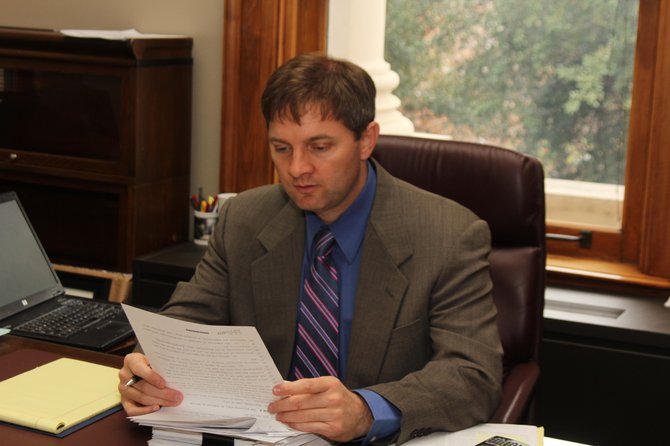Senate Finance Chairman Joey Fillingane said he killed a bill that would have helped Jackson raise money through a 1-percent sales tax because it became too unwieldy. Photo by Virginia Schreiber.
It won't be Christmas in March for Mississippi cities looking to raise cash for infrastructure projects. Until last week, two legislative vehicles would have allowed Jackson to use proceeds from a 1-percent sales tax to pay for infrastructure and construction projects.
Under a 2009 state law, Jackson has the authority to impose the tax with the approval of three-fifths of voters and with oversight from a legislative oversight board.
One bill known as the Community Economic Development Act, or CEDA, would have allowed cities statewide to impose a similar temporary tax if approved through a referendum. The other, HB 546, would have given Jackson majority control over the oversight commission. Senate Finance Committee Chairman Joey Fillingane, R-Sumrall, said that even though a bill similar to HB 546 passed the Senate last year, he killed it this time around after he started getting requests from mayors around the state wanting to be included.
"It became a Christmas tree. It just collapsed under its own weight," Fillingane said.
In the other chamber, CEDA apparently had the converse problem. Rep. Edward Blackmon, a Canton Democrat who chairs the House Municipalities Committee, told the Jackson Free Press Feb. 28 that he held the CEDA bill because he didn't believe it had enough votes.
"I think the more the local officials get involved in pushing it, the more likely it is to (pass)," he said at the time.
Quincy Mukoro, government affairs director for the Mississippi Municipal League, believes CEDA did have enough support in the House. Before it died, CEDA cleared the Senate as well as the House Ways and Means Committee. Mukoro added that 76 local governments passed resolutions supporting CEDA.
In the meantime, the city of Jackson will have to devise other strategies to pay for millions of dollars worth of needed infrastructure projects that are in the works.
"Ultimately, if we can't get a local-option sales tax enacted, then (increased service) rates would be something we would have to consider," City Hall Communication Director Chris Mims said last week.
Bryant Buckling on Medicaid?
Gov. Phil Bryant is still against Medicaid expansion, but says he's now willing to talk about a deal. Specifically, Bryant, who met with hospital executives last week, wants to sit down with hospitals about other ways to cushion the blow from massive funding cuts when certain provisions of the Affordable Care Act go into effect. In a statement issued jointly with the Mississippi Hospital Association, Bryant said he and hospitals "have come together in good faith to work out a possible solution to our funding issues."
Under the ACA, certain hospital funding mechanisms would sunset and be replaced by other revenue streams, primarily state Medicaid expansion. However, Bryant hates Obamacare so much he's refused to talk about covering an extra 300,000 low-income Mississippians with an expanded Medicaid plan.
Chris Anderson, CEO of Singing River Health Systems in Gulfport, said the Medicaid expansion question is "dead end" with Bryant so hospitals will have to work with the governor's administration to find alternate funding sources.
Bryant's newfound religion on at least having a discussion with hospitals came as a bit of a surprise, and might have been the result of political blowback. After Bryant said last week that he does not "see expansion of Medicaid in Mississippi as it exists today, with all its waste, fraud and abuse," legislative Democrats pounced.
"Apparently, in the last few days, it has come to the governor's attention that a program he has been managing for more than 14 months is now fraught with waste, fraud and abuse. If that is the case, it has happened on his watch," stated House Minority Leader Bobby Moak, D-Bogue Chitto, in a news release.
"If this current administration has allowed fraud to occur, the people of Mississippi deserve to know the details. If not, the governor owes all of the hard-working doctors, hospital employees, nursing home staff and other health-care providers an apology."
Almost There
Several little-talked-about bills are headed to Gov. Phil Bryant's desk. Even though students can already pray until kingdom come, SB 2633 would extend the right in Mississippi to student-led prayer to "limited public forums" such as athletic events, commencement ceremonies and morning announcements, and would prohibit schools from punishing kids who pray or express religious viewpoints in class work. It passed the House with no debate 109-6.
Also, a bill concerning controversial loan products is close to becoming law. HB 559, which has passed the both chambers, makes the Check Cashers Act permanent. Until now, the Legislature was required to periodically renew the act.
Comment at www.jfp.ms. Email R.L. Nave at rlnave@jacksonfreepress.com.



Comments
Use the comment form below to begin a discussion about this content.